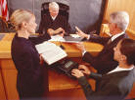It's very upsetting to find someone using your business name, or one that is "confusingly similar." Taking advantage of Trademark law can help prevent problems and protect your rights.Question: What does Trademark law protect?.Trademark protection may be available for any word, phrase, name, symbol, sound (called "the mark") that identifies or distinguishes your product or service from those made or sold by others. It includes the exclusive right to use the mark in connection with the goods and/or services listed in the registration.
Question: When can I use the ? SM or ® ?.Proper usage is important! TM applies to products; SM applies to services. You can use TM or SM without registration. ® stands for registered and can only be used when a trademark has been approved (registered) by the United States Patent and Trademark Office.A trademark should be used as an adjective (not a noun or verb).
For example:.Correct: Rollerblade® inline skates Incorrect: "rollerblades".Correct: Make copies on the XEROX® copier.
Incorrect: XEROX this report.Question: How can I find out if my name (or mark) is eligible for trademark protection?.To see if anyone else is claiming the name or similar name, you can search online (e.g.
, www. google.com) and you will want to confirm the availability of the Internet domain name. You can also search on the Website of the United States Patent and Trademark Office (www.uspto.gov).
These searches do not guarantee that the name is not in use, but they are a good indication of U.S. availability.
More sophisticated international searches are needed if you plan to do business outside the U.S.Question: Do I have to register my mark?.Registration is not required. Common law rights attach as a result of using the mark.
Question: What are the benefits of Trademark Registration?.You can register a mark in your state, nationwide, and internationally. If you register your name/mark, it will show up in search reports and hence others will be on notice of your claim. You also get a legal presumption of ownership and the exclusive right to use the mark when a mark is registered.
Registration also helps in enforcing your rights against an infringement.Question: How do I register my Trademark?.To register a work, go to the Website for the United States Patent and Trademark Office (www.uspto.
gov) and click on Trademarks. You'll find a wealth of information with forms and filing instructions.Question: How do I stop someone from using my name?.
The first step is to investigate whether the other party has registered their name/mark. If your mark is not registered, you should consider registering it. If you think you have superior rights to the name/mark, you will want to notify the other party and make them aware that their name is confusingly similar to yours. Best case, the person will stop using the name/mark. Sometimes an agreement can be worked out for concurrent usage with geographic or other restrictions. Litigation is a last resort, since it is expensive and time consuming.
Question: When can I use someone else's Trademark?.It is lawful to use someone else's mark in certain instances ? called "descriptive fair use" and "nominative fair use." For example, it is OK to use a famous mark in comparative advertising, for news reporting and non-commercial uses. It is not OK to use a mark in a way that implies endorsement, sponsorship or appears to be "passing off" your goods or services as those of the well-known trademark owner.Making fun of or criticizing a famous mark is OK under certain circumstances ? such as http://www.
atkinsdietsucks.com/. To avoid problems, you may want to consult with a knowledgeable attorney before using someone else's trademark.In conclusion, it's a good business practice to think strategically about your name and brand and to be proactive in checking out the availability of the name and protecting your rights.
.Jean Sifleet is a practical and experienced business attorney whose career spans many years in large multi-national corporations and includes three successful entrepreneurial ventures. Jean has extensive experience in dealing with intellectual property matters in the large and small companies and as a small business owner. She has authored numerous books and publications on avoiding legal pitfalls in doing business. This article is excerpted from her new book, Advantage IP ? Profit from Your Great Ideas (Infinity 2005). For more information, Jean's website is http://www.smartfast.
com.
By: Jean Sifleet






